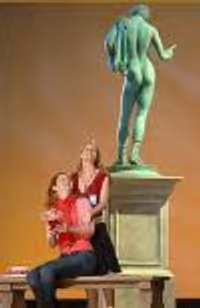IN THE NEXT ROOM Reviews
Roscoe
Broadway Legend Joined: 5/15/03
#50re: IN THE NEXT ROOM Reviews
Posted: 11/20/09 at 11:21amNo, the play being a piece of sh*t is self evident from having had the bad luck to pay good money to sit through it.
Ed_Mottershead
Broadway Legend Joined: 10/20/05
#51re: IN THE NEXT ROOM Reviews
Posted: 11/20/09 at 11:32amI've had no feelings about this show one way or the other since it started previews; now that the reviews are in and generally positive, I think I'll give it a try. NOT because of one critic's say-so, just the fact that it was received favorably by so many of the critical fraternity. One thing it has served to remind me is NOT to listen to the rushed garblings of some of this board's posters who dash to the first preview and make these "learned" pronouncements. In some instances, it seems like it's of more importance to be "first" than to give the show a reasoned appraisal. Not ALL instances, just "some."
Roscoe
Broadway Legend Joined: 5/15/03
#52re: IN THE NEXT ROOM Reviews
Posted: 11/20/09 at 11:38am
I saw it early in previews, and it was pretty clear to me what a crock the play is. And to a lot of the audience that night as well: there were plenty of suddenly empty seats for Act II.
There are folks who love this play, there are folks who really disliked it. As usual, of course.
Brick
Broadway Legend Joined: 11/21/06
#53re: IN THE NEXT ROOM Reviews
Posted: 11/20/09 at 10:04pmI think, quite possibly, we found this year's Pulitzer winner.
#54re: IN THE NEXT ROOM Reviews
Posted: 11/21/09 at 12:55amI frankly think Next Fall is the frontrunner for that particular award.
#55re: IN THE NEXT ROOM Reviews
Posted: 11/21/09 at 3:01amI agree with Kad. As much as I LOVED In the Next Room, I have been predicting that Next Fall would win the Pulitzer since I saw it in August. Brilliant writing.
#56re: IN THE NEXT ROOM Reviews
Posted: 11/21/09 at 3:06am
NY1 is finally up, and it's Mixed-to-Positive, with a dig at Benanti for being too contemporary.
http://ny1.com/1-all-boroughs-news-content/ny1_living/theater_reviews/
#57re: IN THE NEXT ROOM Reviews
Posted: 11/21/09 at 3:20amNEXT FALL absolutely deserves the Pulitzer. I hope it wins.
Roscoe
Broadway Legend Joined: 5/15/03
#58re: IN THE NEXT ROOM Reviews
Posted: 11/24/09 at 12:33pmIN THE NEXT ROOM winning the Pulitzer would be the final nail in the coffin of the Pulitzer's credibility.
Roscoe
Broadway Legend Joined: 5/15/03
#59re: IN THE NEXT ROOM Reviews
Posted: 11/25/09 at 12:15pm
Feingold in the Voice, hardly positive but generous:
Nothing so overpowering happens in Sarah Ruhl's In the Next Room (Lyceum Theatre), an intelligent, erratic work that means to explore the complexities of female sexuality, and of marriage, but gets trapped in its uncertainties of approach. In 1880s New York, a progressive young doctor (Michael Cerveris) uses a newly invented electrical appliance to relieve sexually frustrated wives, till his own untutored wife (Laura Benanti) horns in on the act. Ruhl's premise could produce anything from stark tragedy to giddy sex farce: What she supplies is a kind of jittery tasting menu that offers little dabs of each possibility. Some passages of her writing offer beauty and even heartfelt wisdom; others are merely inane. The repeated sight gag of the Victorian vibrator grows tiresome, because Ruhl hasn't built the surrounding narrative convincingly enough to give it meaning.
Les Waters's production echoes Ruhl's indecisiveness of tone, never settling clearly in one period or one style. Cerveris, always to be relied on, hews to the 1880s, making the blindered, driven scientist a touchingly real figure. Quincy Tyler Bernstine, as a servant, and Wendy Rich Stetson, as Cerveris's impassive assistant, play with doughty realism; Chandler Williams cannily imbues an artist-patient with a high-flown manner that never veers into excess. Against these performances, Maria Dizzia plays the principal patient in a shrill, contemporary tone straight from SNL, Thomas Jay Ryan makes her husband a brash vaudeville-sketch lout, and poor Benanti, apparently adrift between the two approaches, veers this way and that like a shipwreck victim wondering which way to turn for rescue.
Videos



